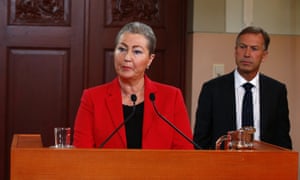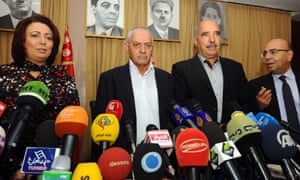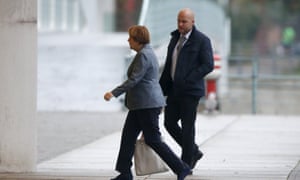Angela Merkel, Pope Francis and John Kerry to be awarded 2015 Nobel peace prize among others
Nobel peace prize live announcement.
 I was completely wrong in my last-minute tip that Denis Mukwege would win. However, I will claim the credit for my earlier, much safer prediction that no one can really predict who will get it.
I was completely wrong in my last-minute tip that Denis Mukwege would win. However, I will claim the credit for my earlier, much safer prediction that no one can really predict who will get it.A point of order I should stress from the announcement: the prize goes to the quartet as an entity, not its individual member organisations, the Tunisian General Labour Union; the Tunisian Confederation of Industry, Trade and Handicrafts; the Tunisian Human Rights League; and the Tunisian Order of Lawyers.

Kaci Kullmann Five, head of the Norwegian Nobel peace prize committee, announces the winner.
There are currently some questions and answers in Norwegian, being taken by the announcer of the award, businesswoman Kaci Kullmann Five whose name, like that of the Tunisian National Dialogue Quartet, sounds to English ears a bit like that of a jazz group.

A photo from 21 September 2013 showing members of the quartet, left to right: president of the Tunisian employers union (UTICA), Wided Bouchamaoui, secretary general of the Tunisian General Labour Union (UGTT) Houcine Abbassi , president of the Tunisian Human Rights League (LTDH), Abdessattar ben Moussa and the president of the National Bar Association, Mohamed Fadhel Mahmoud. Photograph: Fethi Belaid/AFP/Getty Images
This could arguably be seen as the key element of the citation:
More than anything, the prize is intended as an encouragement to the Tunisian people, who despite major challenges have laid the groundwork for a national fraternity which the Committee hopes will serve as an example to be followed by other countries.
Amid the chaos of Syria, Yemen and elsewhere, and the knock-on effect of the worst migrant crisis in Europe since World War II, the committee has chosen to honour a country which has taken a different route, in the hope it can be a beacon to others.
The Norwegian Nobel Committee has decided that the Nobel Peace Prize for 2015 is to be awarded to the Tunisian National Dialogue Quartet for its decisive contribution to the building of a pluralistic democracy in Tunisia in the wake of the Jasmine Revolution of 2011. The Quartet was formed in the summer of 2013 when the democratization process was in danger of collapsing as a result of political assassinations and widespread social unrest. It established an alternative, peaceful political process at a time when the country was on the brink of civil war. It was thus instrumental in enabling Tunisia, in the space of a few years, to establish a constitutional system of government guaranteeing fundamental rights for the entire population, irrespective of gender, political conviction or religious belief.
The National Dialogue Quartet has comprised four key organizations in Tunisian civil society: the Tunisian General Labour Union (UGTT, Union Générale Tunisienne du Travail), the Tunisian Confederation of Industry, Trade and Handicrafts (UTICA, Union Tunisienne de l’Industrie, du Commerce et de l’Artisanat), the Tunisian Human Rights League (LTDH, La Ligue Tunisienne pour la Défense des Droits de l’Homme), and the Tunisian Order of Lawyers (Ordre National des Avocats de Tunisie). These organizations represent different sectors and values in Tunisian society: working life and welfare, principles of the rule of law and human rights. On this basis, the Quartet exercised its role as a mediator and driving force to advance peaceful democratic development in Tunisia with great moral authority. The Nobel Peace Prize for 2015 is awarded to this Quartet, not to the four individual organizations as such.
The Arab Spring originated in Tunisia in 2010-2011, but quickly spread to a number of countries in North Africa and the Middle East. In many of these countries, the struggle for democracy and fundamental rights has come to a standstill or suffered setbacks. Tunisia, however, has seen a democratic transition based on a vibrant civil society with demands for respect for basic human rights.
An essential factor for the culmination of the revolution in Tunisia in peaceful, democratic elections last autumn was the effort made by the Quartet to support the work of the constituent assembly and to secure approval of the constitutional process among the Tunisian population at large. The Quartet paved the way for a peaceful dialogue between the citizens, the political parties and the authorities and helped to find consensus-based solutions to a wide range of challenges across political and religious divides. The broad-based national dialogue that the Quartet succeeded in establishing countered the spread of violence in Tunisia and its function is therefore comparable to that of the peace congresses to which Alfred Nobel refers in his will.
The course that events have taken in Tunisia since the fall of the authoritarian Ben Ali regime in January 2011 is unique and remarkable for several reasons. Firstly, it shows that Islamist and secular political movements can work together to achieve significant results in the country’s best interests. The example of Tunisia thus underscores the value of dialogue and a sense of national belonging in a region marked by conflict. Secondly, the transition in Tunisia shows that civil society institutions and organizations can play a crucial role in a country’s democratization, and that such a process, even under difficult circumstances, can lead to free elections and the peaceful transfer of power. The National Dialogue Quartet must be given much of the credit for this achievement and for ensuring that the benefits of the Jasmine Revolution have not been lost.
Tunisia faces significant political, economic and security challenges. The Norwegian Nobel Committee hopes that this year’s prize will contribute towards safeguarding democracy in Tunisia and be an inspiration to all those who seek to promote peace and democracy in the Middle East, North Africa and the rest of the world. More than anything, the prize is intended as an encouragement to the Tunisian people, who despite major challenges have laid the groundwork for a national fraternity which the Committee hopes will serve as an example to be followed by other countries.
Announcing the award the committee says the Quartet is honoured for its work in helping ensure Tunisia’s post-Arab Spring direction was broadly peaceful and democratic. It is directly comparable to the peace conferences mentioned by Alfred Nobel in his will, they add.
Here come the committee members, about to enter the journalist-filled room. Nearly time now.
A last-minute prediction, you say? Well, if pushed I’ll go for Denis Mukwege. He has been tipped several times before. Merkel, the Pope or Kerry/Zarif just seem too contentious. But I might well be proved wrong very, very soon.
Ten minutes to go. Judging from the live video feed above, all the reporters in Oslo are still milling about, chatting. It’s time they took their seats if we’re to not be late.
There’s a sense of expectation in the Vatican, writes my colleague John Hooper:
If the density of waiting journalists per square metre is anything to go by, Francis is a shoe-in. I’m in the Vatican’s press room, and it is packed. Not a seat to be had anywhere as correspondents accredited to the Holy See wait for the result.
One set of possible prize-winners we have not as yet mentioned: Colombia’s president, Juan Manuel Santos and rebel leader Rodrigo Londono aka Timoleón Jiménez, leader of the Farc rebel group, who brokered the country’s peace deal. As I mentioned below, the Nobel committee does love peace deals.
Further to the item below, here’s a handy graphic as to how the prize-winner is selected.
It’s worth noting that if Angela Merkel does win – and again I stress, just because she’s the bookies’ favourite does not mean it will be so – she will not be the first serving German chancellor to take the peace prize. In 1971, Willy Brandt was honoured for his efforts of rapprochement to the countries of the Soviet bloc.

This could arguably be seen as the key element of the citation:
More than anything, the prize is intended as an encouragement to the Tunisian people, who despite major challenges have laid the groundwork for a national fraternity which the Committee hopes will serve as an example to be followed by other countries.
Amid the chaos of Syria, Yemen and elsewhere, and the knock-on effect of the worst migrant crisis in Europe since World War II, the committee has chosen to honour a country which has taken a different route, in the hope it can be a beacon to others.
The Norwegian Nobel Committee has decided that the Nobel Peace Prize for 2015 is to be awarded to the Tunisian National Dialogue Quartet for its decisive contribution to the building of a pluralistic democracy in Tunisia in the wake of the Jasmine Revolution of 2011. The Quartet was formed in the summer of 2013 when the democratization process was in danger of collapsing as a result of political assassinations and widespread social unrest. It established an alternative, peaceful political process at a time when the country was on the brink of civil war. It was thus instrumental in enabling Tunisia, in the space of a few years, to establish a constitutional system of government guaranteeing fundamental rights for the entire population, irrespective of gender, political conviction or religious belief.
The National Dialogue Quartet has comprised four key organizations in Tunisian civil society: the Tunisian General Labour Union (UGTT, Union Générale Tunisienne du Travail), the Tunisian Confederation of Industry, Trade and Handicrafts (UTICA, Union Tunisienne de l’Industrie, du Commerce et de l’Artisanat), the Tunisian Human Rights League (LTDH, La Ligue Tunisienne pour la Défense des Droits de l’Homme), and the Tunisian Order of Lawyers (Ordre National des Avocats de Tunisie). These organizations represent different sectors and values in Tunisian society: working life and welfare, principles of the rule of law and human rights. On this basis, the Quartet exercised its role as a mediator and driving force to advance peaceful democratic development in Tunisia with great moral authority. The Nobel Peace Prize for 2015 is awarded to this Quartet, not to the four individual organizations as such.
The Arab Spring originated in Tunisia in 2010-2011, but quickly spread to a number of countries in North Africa and the Middle East. In many of these countries, the struggle for democracy and fundamental rights has come to a standstill or suffered setbacks. Tunisia, however, has seen a democratic transition based on a vibrant civil society with demands for respect for basic human rights.
An essential factor for the culmination of the revolution in Tunisia in peaceful, democratic elections last autumn was the effort made by the Quartet to support the work of the constituent assembly and to secure approval of the constitutional process among the Tunisian population at large. The Quartet paved the way for a peaceful dialogue between the citizens, the political parties and the authorities and helped to find consensus-based solutions to a wide range of challenges across political and religious divides. The broad-based national dialogue that the Quartet succeeded in establishing countered the spread of violence in Tunisia and its function is therefore comparable to that of the peace congresses to which Alfred Nobel refers in his will.
The course that events have taken in Tunisia since the fall of the authoritarian Ben Ali regime in January 2011 is unique and remarkable for several reasons. Firstly, it shows that Islamist and secular political movements can work together to achieve significant results in the country’s best interests. The example of Tunisia thus underscores the value of dialogue and a sense of national belonging in a region marked by conflict. Secondly, the transition in Tunisia shows that civil society institutions and organizations can play a crucial role in a country’s democratization, and that such a process, even under difficult circumstances, can lead to free elections and the peaceful transfer of power. The National Dialogue Quartet must be given much of the credit for this achievement and for ensuring that the benefits of the Jasmine Revolution have not been lost.
Tunisia faces significant political, economic and security challenges. The Norwegian Nobel Committee hopes that this year’s prize will contribute towards safeguarding democracy in Tunisia and be an inspiration to all those who seek to promote peace and democracy in the Middle East, North Africa and the rest of the world. More than anything, the prize is intended as an encouragement to the Tunisian people, who despite major challenges have laid the groundwork for a national fraternity which the Committee hopes will serve as an example to be followed by other countries.
Announcing the award the committee says the Quartet is honoured for its work in helping ensure Tunisia’s post-Arab Spring direction was broadly peaceful and democratic. It is directly comparable to the peace conferences mentioned by Alfred Nobel in his will, they add.
Here come the committee members, about to enter the journalist-filled room. Nearly time now.
A last-minute prediction, you say? Well, if pushed I’ll go for Denis Mukwege. He has been tipped several times before. Merkel, the Pope or Kerry/Zarif just seem too contentious. But I might well be proved wrong very, very soon.
Ten minutes to go. Judging from the live video feed above, all the reporters in Oslo are still milling about, chatting. It’s time they took their seats if we’re to not be late.
There’s a sense of expectation in the Vatican, writes my colleague John Hooper:
If the density of waiting journalists per square metre is anything to go by, Francis is a shoe-in. I’m in the Vatican’s press room, and it is packed. Not a seat to be had anywhere as correspondents accredited to the Holy See wait for the result.
One set of possible prize-winners we have not as yet mentioned: Colombia’s president, Juan Manuel Santos and rebel leader Rodrigo Londono aka Timoleón Jiménez, leader of the Farc rebel group, who brokered the country’s peace deal. As I mentioned below, the Nobel committee does love peace deals.
Further to the item below, here’s a handy graphic as to how the prize-winner is selected.
It’s worth noting that if Angela Merkel does win – and again I stress, just because she’s the bookies’ favourite does not mean it will be so – she will not be the first serving German chancellor to take the peace prize. In 1971, Willy Brandt was honoured for his efforts of rapprochement to the countries of the Soviet bloc.

Angela Merkel arrives in Berlin this morning before heading to London. Photograph: Fabrizio Bensch/Reuters
Comments
Post a Comment